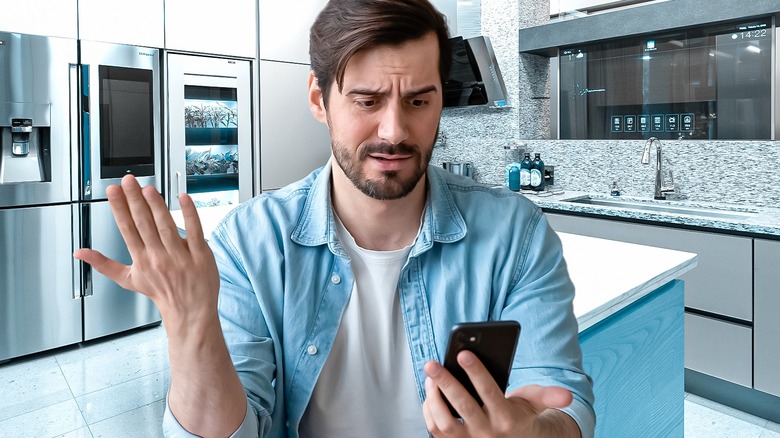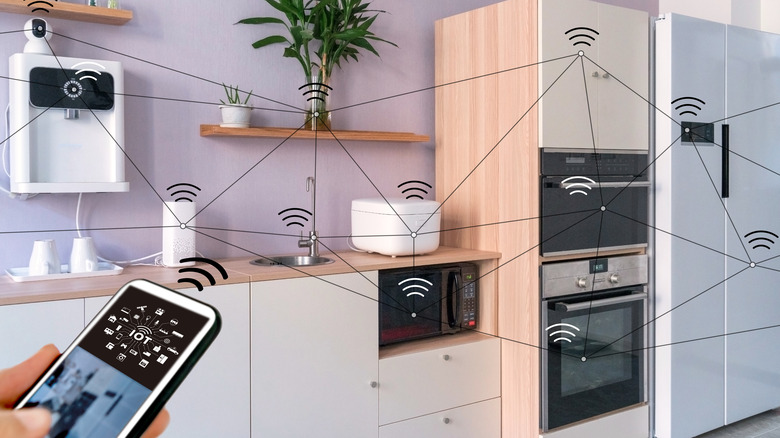I Don't Want My Fridge To Text Me: The Argument Against 'Smart Kitchens'
Back in December 2022, Samsung announced the release of what the tech company calls its "Family Hub Plus" smart refrigerator. This fridge, alongside its usual refrigerating capabilities, includes a 32-inch touchscreen built into the door, similar to that of an average Samsung phone. The Family Hub Plus screen allows you to display family photos, watch TV, and even act as a "control hub" for other smart devices in your home. If you think this description of a refrigerator sounds about the same as a description of a smartphone, well, you wouldn't be too off the mark.
It's true that we're very fortunate to live in a time where such technology is common. The average smartphone is still a bona fide marvel, after all, and it's hard to imagine the 21st century without it. But as impressive as these technologies are, we've come to a point where we need to say enough is enough. Do we really need an app for this? Does this average appliance really need Bluetooth capabilities? Why do I need to connect my dishwasher to my Wi-Fi just to wash dishes?
As smart technology continues to march onward, we must first stop and examine just how "useful" so-called "smart kitchens" actually are. Do we really need a smart kitchen, or is it a symptom of a world obsessed with the latest shiny toy that catches our eye?
Many of your smart kitchen's features are redundant
There are smart refrigerators with texting capabilities that allow their owners to see the contents of their fridges at any given time, and smart dishwashers controlled by a phone app so one doesn't have to leave their couch in order to start a wash cycle. While this all sounds fancy on paper, these features can actually be pretty redundant — or even just more trouble than they're worth.
Joe Ray of Wired explains that a hands-on interface is actually much simpler than using a connected app. "Appliances look sleek with no buttons and knobs, but those are very effective ways to turn things on and off and adjust settings," Ray notes. He's not wrong. If you want to turn on the back burner, you just turn a dial. If you want to start your dishwasher, you just press a button. With a smart appliance, you have to log into your phone, log in through the app, and navigate through it until you can finally turn on the appliance. In that same amount of time, you could have probably just gotten up and turned it on yourself.
Most "smart features" are things that would take little time to do otherwise. Why do you need your fridge to give you text messages when you're running out of milk when common sense would dictate it by how light the carton or jug feels? You still have to manually load your dishwasher anyway, so how hard is it to use an extra second to just turn it on?
Smart appliances could become a crutch
Of course, it's understandable why smart appliances were (and are still) welcomed into kitchens worldwide: We all need a little help in our lives, and the kitchen is certainly one place where help is always welcomed. It would be disingenuous to say that having a dishwasher that automatically washes a dirty load with a simple voice command or being able to make a hands-free phone call when you're in the middle of making food would be a lie. These technologies do indeed provide us with some help when we would need it most. But who's to say that these technologies — these smart appliances — wouldn't become more of a crutch in the future than they already possibly are?
One of the most vital parts of any kitchen is how people interact with their tools, as Mehreen Kasana pointed out in a 2020 article for Inverse. In a way, people explore their own capabilities by using their appliances and accouterments, whether it's an oven, a microwave, or a collection of pans. People may make mistakes when using these appliances — that's just an inevitable part of working with any appliance or tool — but there's something to learn from those mistakes.
Yes, these mistakes aren't good, per se, but you at least learn from them and improve from there. That's the beauty of the kitchen, really: experimenting and learning. Replacing our own potential with smart appliances takes those rich experiences away from us — the ones that not only make for better chefs, but for more resourceful people, too.


